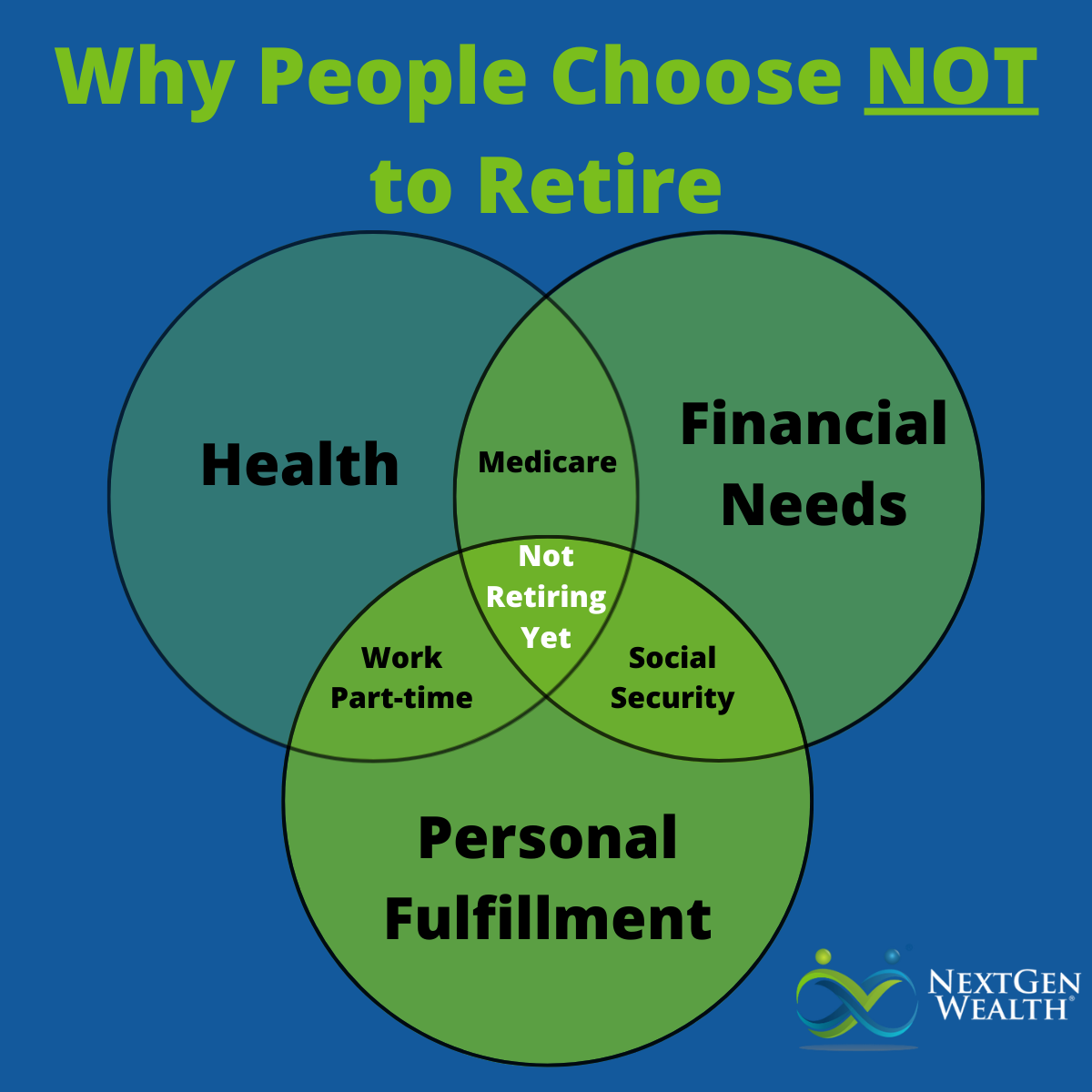Why Everyone Isn't Made for Retirement

This post was last updated on May 25, 2025, to reflect all updated information and best serve your needs.
For some people, the “traditional” idea of retirement just doesn’t fit their lifestyle. The idea of never working again, going to the golf course every day, and just lounging around doesn’t sound very appealing. Luckily, you can craft what retirement will look like for you – even if you don’t really retire.
For many Americans, retirement is tied to a set age like 65 or 67. However, turning 65 doesn’t mean you actually have to retire - and not everyone does. For Social Security, the “full retirement age” is between 65 and 67 years old, but you don’t have to stop working at some random age set by the government.
Table of Contents
How 65 Became “The” Retirement Age
Retirement as we know it today developed in the 20th century. For context, the life expectancy of the average American in 1900 was 47 years of age. At the turn of the new millennium in 2000, the life expectancy of Americans had risen to 77 years of age.
In other words, until the 20th century, retirement wasn’t really “a thing” because very few people lived long enough. At the beginning of the century, infectious disease was much more likely to kill you than old age.
Most people just worked until they died. And nobody knew any different. When the Social Security Act was passed in 1935, life expectancy was 62.
The Social Security Act originally set the age you would become a “qualified individual” at age 65. So if you were lucky enough to live past the normal life expectancy, you’d receive benefits to ensure you wouldn’t be poor in old age. Fast forward to 2024 and we’re still using roughly the same age to start Social Security and Medicare benefits.
Some People Choose Not to Retire at 65 (or Ever)
Some people choose to remain in the workforce once they reach the “traditional retirement age.” There are many reasons to continue working well into your 70’s or later. These include:
- Personal Fulfillment
- Financial Needs
- Health
In some cases, you may even want to return to work after some time to decompress in retirement.

Personal Fulfillment
Retiring can be quite an adjustment. Many retirees end up feeling lonely or isolated, which can be harmful to your overall well-being. The antidote is finding activities which give you a sense of purpose and meaning.
Continuing to Work
You might find yourself in a role you find fulfilling already. If so, there’s nothing wrong with working longer. However, once you stop feeling joy and fulfillment, it’s time to hang it up and move on to something else.
Part-time Employment
Maybe you still like what you do, but you’d also like to travel or spend more time with family. Shifting to a part-time role could be a solution. This creates a balance to keep you engaged yet not overwhelmed either.
You could shift into a role as a mentor, trainer, or consultant. This can be a great benefit to you for the additional income and fulfillment. Even better, you can also share your expertise with younger, less experienced workers too.
Starting a Business
Have you ever dreamed of running your own business? If so, leaving your main career and starting your own thing might be the best way to go.
You’ll want to avoid spending too much of your retirement savings getting your business started. However, some businesses don’t take much to get off the ground. For example, starting a consulting firm might take very little start-up capital to be a success.
Financial Needs
This is the least fun reason to work longer, but it’s not the end of the world either. Even more importantly, you might not actually need to work longer. In our article on how inflation affects your retirement, we show how working longer may not be necessary if you can make some other adjustments.
However, if you decide to work longer, you still need to have some specific goals. You’ll want to make sure you’ve got your bases covered and plan out when you can retire. We want to prevent you from working a job you don’t like longer than you have to – or until you physically can’t anymore.
You might be surprised at how much tax strategies like Roth conversions or a different Social Security strategy might change your situation.
Higher Social Security Benefits
The calculations of your Social Security benefits are determined based on your top 35 years of earnings. Every additional high-paying year you work, the higher your payout. Also, delaying the date you start drawing Social Security from ages 62-70 increases your benefit by 3-8% per year you delay.
Health Benefits
Working part-time in retirement can make you healthier than people who stop working altogether. Studies have found part-time work in your previous career field was beneficial. Social interaction with people in the office can have real benefits to our wellbeing.
If you think about it, we spend a large portion of our lives with our coworkers. If you just cut out of the office entirely, you might have a difficult time adjusting. As mentioned earlier, shifting to a part-time role might be the best way to “bridge” into retirement.
Healthcare Costs and Availability
Retiring before age 65 means you’ll have to worry about how to pay for health care. You’ll also have to hope you aren’t denied coverage due to a pre-existing condition. For many Americans, healthcare offered through an employer is vital to getting the care we need.
Even when you qualify for Medicare, out-of-pocket costs can add up. Long-term care is an expense you'll need to consider how to cover without Medicare. You may need to look into a Medigap or Medicare Advantage plan as well.
Getting Spouses on the Same Page
There are some couples that disagree on when each other should retire. Even if a couple does retire together, spending every minute of every day with each other can put stress on a marriage.
Obtaining a job away from home might make each other feel free and more independent. It could also give you and your spouse more to talk about. We also don’t want to be tripping over each other all day.
The unique aspects of each other is what keeps you interested in one another. If both partners are able to get “alone time” to pursue their own interests and hobbies, it will make time together even more special. Just because you’re retired doesn't mean you want to spend every single second with each other.
Deciding Whether Retirement is For You
Are you within five years of retirement? If so, now is the time to really look at what you want retirement to look like. Is a “traditional” retirement the right thing for you?
If you’re in a job you enjoy, maybe you don’t really need to retire. However, it might be nice to have a little more time for other pursuits. It’s also possible you can’t imagine doing anything else than what you’re doing right now.
Regardless, you’ll need to make decisions about what life after 65 looks like. The time to decide is before you retire, not after.
NextGen Wealth Helps You Transition into Your Own Version of Retirement
NextGen Wealth can assist you in building a plan to maximize your retirement – even if you never really "retire" in the traditional sense. We specialize in the transition into retirement and continue with you throughout your journey in life.
Our COLLAB Financial Planning Process™ is designed to help you shape your own life around what’s most important to you. We engage with you in a process to align your money with a clear vison of what you want your future to look like.
We’re here to ensure you get to live the life you want – even if you don’t follow the traditional retirement path.



